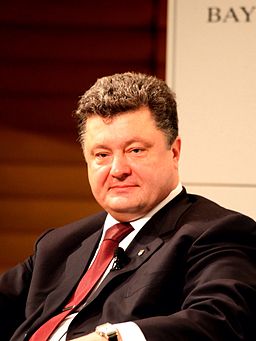Poroshenko Versus Who?
On May 25th, the Ukrainians will elect a new president. Although as recently as late 2013 Petro Poroshenko was seen as potential candidate for president his chances were seen as bleak. Today, few believe that he cannot win.
April 4, 2014 -
Paweł Pieniążek
-
Articles and Commentary

Petro Poroshenko at the Munich Security Conference 2010 Photo: Kathrin Möbius (cc) commons.wikimedia.org
The oligarch and owner of the Roshen confectionery corporation, Poroshenko as recently as November was not viewed as a candidate who had a realistic chance of winning the elections that were planned for 2015. Vitali Klitschko, leader of the UDAR party, was seen as the most difficult competitor for Viktor Yanukovych. In reality support for him grew very quickly and already by the end of October – in accordance with public opinion polls – he was capable of defeating the incumbent in the second round. After the Maidan protests erupted this margin of victory grew even more. In December in the second round Arseniy Yatsenyuk and Oleh Tiahnybok, the leaders of Batkivshchyna and Svoboda, respectively, were ahead of Yanukovych.
For over three months, Poroshenko was very active at the Maidan: he frequently had public appearances, he appeared in “difficult” places (usually during various clashes with the militia; he was one of the first politicians to travel to Crimea when Russian troops appeared there) and he tried to mitigate the situation. The television station 5 Kanal, which is owned by Poroshenko, promoted him strongly. As a result after Yanukovych’s overthrow by the Maidan Poroshenko started leading the presidential race. In a poll done by the four largest Ukrainians public opinion centres (SOCIS, KMIS, Rejtinh, Razumkov Centre; 6,000 respondents from all parts of Ukraine excluding Crimea) the oligarch gained 24.9 per cent of votes (36.2 per cent among those who declared they would participate in the elections). He had a significant lead over the remaining candidates. Klitschko came in second place (8.9 per cent; 12.9 per cent among those who plan on voting), and just behind him the former Prime Minister Yulia Tymoshenko (8.2 per cent; 12 per cent). The only candidate from the governing camp who in the poll was relatively on par with the top candidates was the deputy chief of the Party of Regions Serhiy Tihipko (7.3 per cent; 10 per cent). In the second round Poroshenko’s margin of victory grew even more.
On March 29th at the summit of the UDAR party Klitschko declared that he would not enter into an electoral duel with Poroshenko. What is more the oligarch gained his support. Klitschko himself decided to be the candidate for the mayor of Kyiv. Will the withdrawal of the former boxer from the presidential elections mean that Poroshenko has nothing to worry about?
The latest poll, which takes into consideration Klitschko’s withdrawal, shows that support for the oligarch is growing (38.3 per cent). Behind him are Tihipko (17.9 per cent) and Tymoshenko (11.6 per cent). In fourth place is Yuri Boyko, the former deputy prime minister in Mykola Azarov’s government (6.9 per cent). However, these studies should be taken with a grain of salt. The little-known organisation “Progressive Legal Initiatives” which undertook this poll may be tied to the Party of Regions. Furthermore, in two days 4,500 people were surveyed, which seems improbable.
Nonetheless, Tihipko’s sliding into second place is not entirely impossible, although it will not be an easy task. In 2010 in the presidential elections he gained a much better electoral result than was expected: 13.06 per cent, which put him in third place. He had a significant lead over the current Prime Minister Arseniy Yatsenyuk (6.96 per cent). Then, however, Tihipko was the candidate of the Strong Ukraine party and was not unambiguously tied to the Party of Regions. After that party’s fall from grace because of the Maidan events repeating the 2010 result could be impossible. There is also the large number of candidates tied to the previous government, the aforementioned Boyko or the former head of the Kharkov Verkhovna Rada Mykhailo Dobkin. Without a doubt they will take a few percentage points away from Tihipko, by which they can deprive him of a chance at a second round.
The more probable scenario is that in the second round Poroshenko will meet Tymoshenko. The former prime minister has decided to fight for the presidential office regardless of the fact that her chances are much smaller than they were in 2010 when she lost the presidency to Yanukovych in the second round by a hair (45.47 per cent to 48.95 per cent). Many people had grievances because of the way she governed and, as a result of her conflicts over power with President Viktor Yanukovych, she led the country to the verge of bankruptcy. Often one can hear the opinions that her estate comes from suspicious sources. The Ukrainians are counting on something new and Tymoshenko is a symbol of the old, not necessarily good times.
Compared to them, Poroshenko appears to be a professional and man of compromise who was capable of functioning in various political environments: he was in Azarov’s government and later in Tymoshenko’s. Although he performed important functions (he was the chief of the council of the National Bank of Ukraine, the minister of foreign affairs and the minister of economic development and trade), he is not tied to the shamed establishment.
If the situation does not change drastically – this can be, for example, further aggression of Russia or attempts at the destabilisation of Ukraine using other means – Poroshenko’s position does not appear to be threatened. Considering the current balance of power he seems to be for the majority of Ukrainians wanting change to be the only serious alternative to the ancien regime, both the “orange” and “blue” ones.
Paweł Pieniążek is a journalist specialising in Eastern Europe. He is a contributor with the Polish daily Dziennik Opinii, New Eastern Europe and the Polish magazine W Punkt.

































